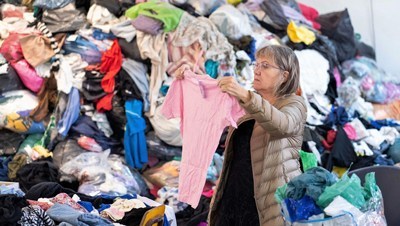December 8, 2020 by J-Wire Newsdesk
Read on for article
Re-Born Global, Israel’s first platform for a circular economy in textiles, has launched Re-Born Textiles, the first circular management system for textile waste.

Re-Born Textiles, the flagship project of Re-Fresh Global, offers solutions for textile waste. Photo by Liran Maimon.
Co-founders Revital Nadiv and Viktoria Kanar decided to combine innovation and sustainable thinking to create an urban solution for textile waste that mostly goes to landfills, incineration or is shipped to other continents.
With the overall fashion industry being responsible for 10 per cent of global carbon emissions, the need for change and innovative solutions is imminent.
Israel is committed to the 2030 Sustainable Development Goals agenda put forth by the United Nations. This includes the goals to promote and advance a circular economy, sustainable cities, responsible consumption and production, and climate action.
Re-Born Textiles, the flagship project of Re-Fresh Global, offers solutions based on a three-pillar system: discarded clothes in new/almost new condition are returned to retail (Re-Use); discarded clothes and textiles are upcycled into new textile products with the help of new technology (Re-Make); and clothes and textiles are recycled and used for other industries, such as construction and the automobile industry (Re-Cycle).
The pilot program will take place in Kfar Saba, which has its own sustainability centre, Kipod. Nearly 100 women from throughout the country have participated in a course to learn about the challenges and solutions for the fashion and textile industry, as well as professional textile sorting and management, and secondhand marketing.
Kfar Saba Mayor Raffi Saar said at the launch of the project, “in order to promote issues of this type and others, we work with research and academic bodies, and as part of international collaborations, to examine and implement innovative and diverse solutions for the separation and treatment of waste in all its shades. At the same time, we are working to strengthen the information channels in front of the residents regarding changing consumption habits and separating waste.”
He added that “the cooperation of all of us together can bring about total social change, for the future of our children, for the future of us all, for the future of the planet.”
Other key supporters include the German embassy in Israel.
Ambassador Dr Susanne Wasum-Rainer said “promoting sustainability and a greener economy to mitigate climate change is one of the core priorities of Germany’s European Union council presidency. We believe that the current health crisis holds an enormous opportunity to change things towards increased sustainability, including improving the waste management of the textile industry. And we felt that the Re-Born project, also in regard to its social element, was more than needed, and it is our pleasure to join the initiative’s efforts to make the world a little greener.”
JNS
Related posts:
Views: 0
 RSS Feed
RSS Feed

















 December 8th, 2020
December 8th, 2020  Awake Goy
Awake Goy  Posted in
Posted in  Tags:
Tags: 
















